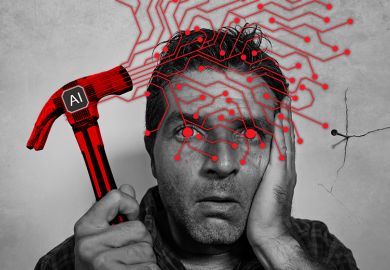Since the 19th century, the central mission of universities has been to foster critical thinking, and societies depend on this to adapt and progress. Yet, as I discuss in a Centre for Global Higher Education working paper, the advent of globalisation has raised questions about how universities may themselves need to adapt if they are to continue to be effective.
What is the role of higher education in a globalised world?
Historically, universities have had a central role in societal progression. The momentum of the first Industrial Revolution built up gradually from about 1500, reaching a significant “phase transition” around 1820, when the system took off in Enlightenment Europe.
The basic formula remained positive and expansive for most of the second half of the 20th century, and helped to shape much of the rest of the world – partly in its own image.
This has been seen by many as a miraculous and fortuitous combination of forces. Prime among these forces were societal variety and intellectual curiosity, the latter nurtured by universities, which fed off each other during this period.
The critical thinking that was the main catalyst in the vast social reaction of the first Industrial Revolution was the product of what Joel Mokyr, in his most recent study, has called The Republic of Letters. In using this term, Mokyr pays tribute to the cultural phenomenon inside the political-economic story.
This Europe-wide network of individual scholars and craftsmen constantly redefined how things worked, and should work, and created the fertile fusing of science and technology. Since the 19th century, that critical role has been absorbed into the mission of universities, and it remains their central purpose.
Some have suggested that this “modern” formula can keep going as long as it is adaptive. Others have predicted that it will bring about its own demise.
What is still little realised is that this formula has, in fact, already come to an end. We may be too close to current events to recognise that another historical “phase transition” has now begun, and can be dated from about 1990. This is when the information revolution, and the globalisation that accompanied it, broke the central structure of the first formula for modernisation.
This central structure was the moral compact in the Group of Seven countries (now the G8) between corporations and workers to support stable, predictable long-term employment. As a consequence, in 1990 the G7 countries had 64 per cent of world gross domestic product. That figure has since fallen to 46 per cent. Conversely, in this same period the combined portion of world GDP for India and China has risen from 5 per cent to 16 per cent.
Another destabilising change that has occurred from 1990 onwards is that ideas have taken flight from their origins.
Lower communications costs have led to an explosion in the transferring of knowledge. Production systems have separated into new globally coordinated structures with no real national homes. The viability of earlier organisations and their attached jobs has come under severe pressure; government power to control events has weakened in favour of corporate logic; and firms go shopping for distinct societal advantages to co-opt, often taking risks beyond their comfort zone and requiring new managerial skills.
So where does higher education fit in this new scenario? Five questions now arise for universities:
- whether and how to join the globalised economy themselves
- in doing so, how to protect the duty to foster critical thinking against the forces of pragmatic training
- how to reconstruct education in such a way that it adapts to the restructuring of labour markets (as with, for example, lifelong learning) and to credentialing systems that help those loosely employed
- how to foster the new “people skills” now seen as crucial in the world of more fragile and shifting alliances
- how to foster good citizenship in a space where its value may not be immediately apparent.
But above all else, universities have a responsibility to be forward-thinking. Before redefining a set of purposes for the continued existence of a university, there is a need to read and interpret the surrounding complex, global – often unmeasurable – macro-changes and decide which of them require the most serious attention.
If they are inconveniently obscure, that does not mean they are less threatening.
Gordon Redding is visiting professorial fellow at the UCL Institute of Education, and fellow at the HEAD Foundation, Singapore.
Register to continue
Why register?
- Registration is free and only takes a moment
- Once registered, you can read 3 articles a month
- Sign up for our newsletter
Subscribe
Or subscribe for unlimited access to:
- Unlimited access to news, views, insights & reviews
- Digital editions
- Digital access to THE’s university and college rankings analysis
Already registered or a current subscriber?







